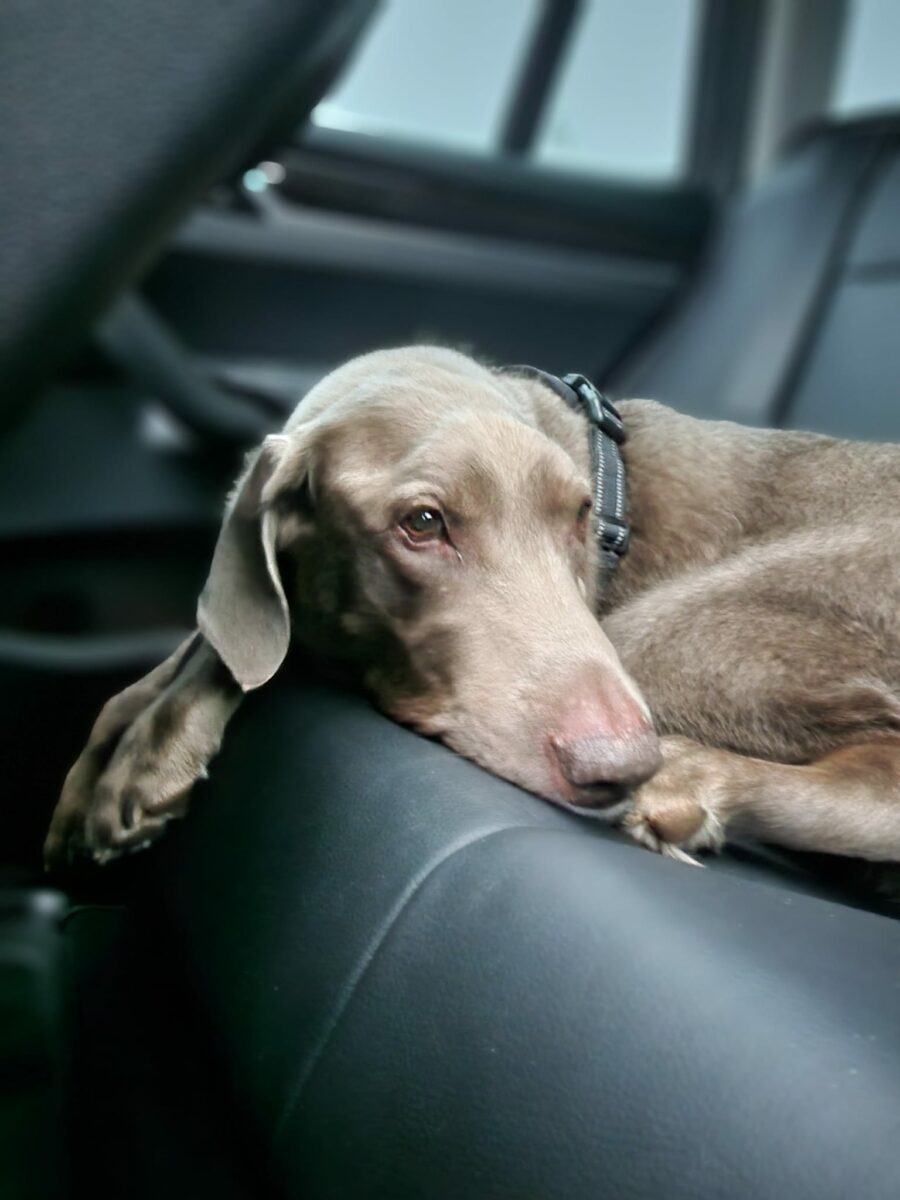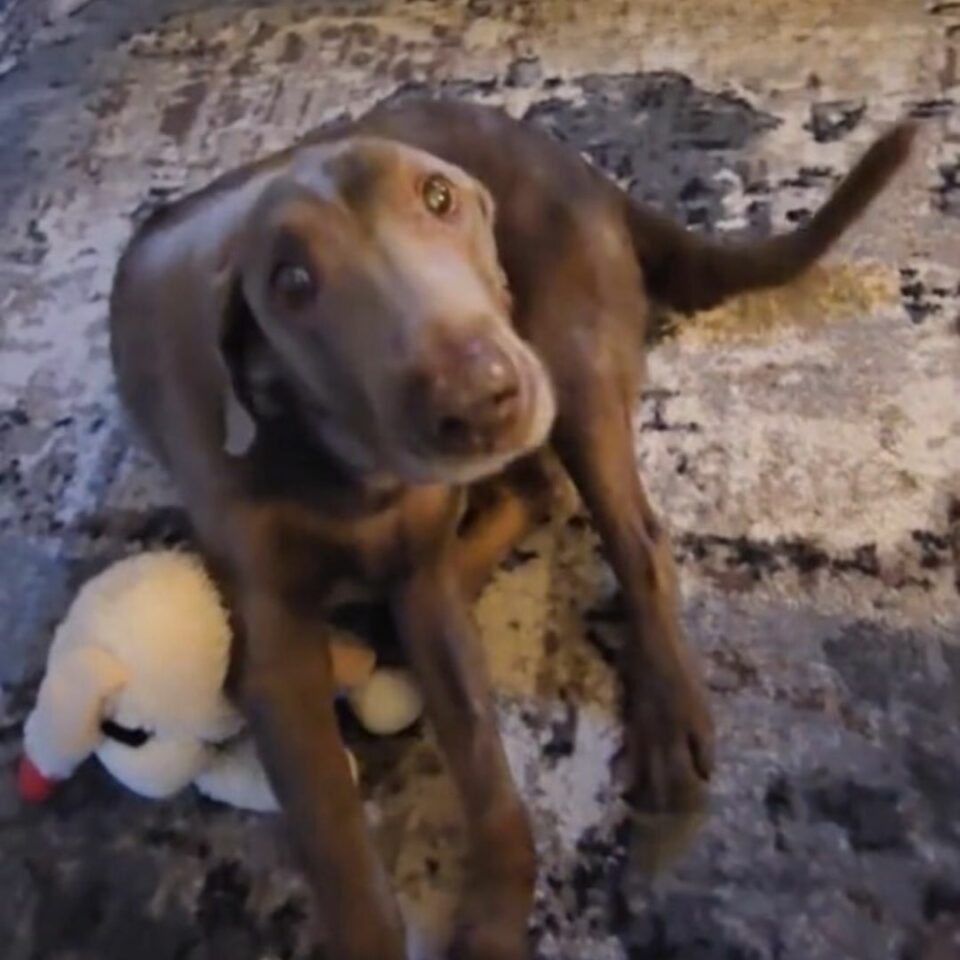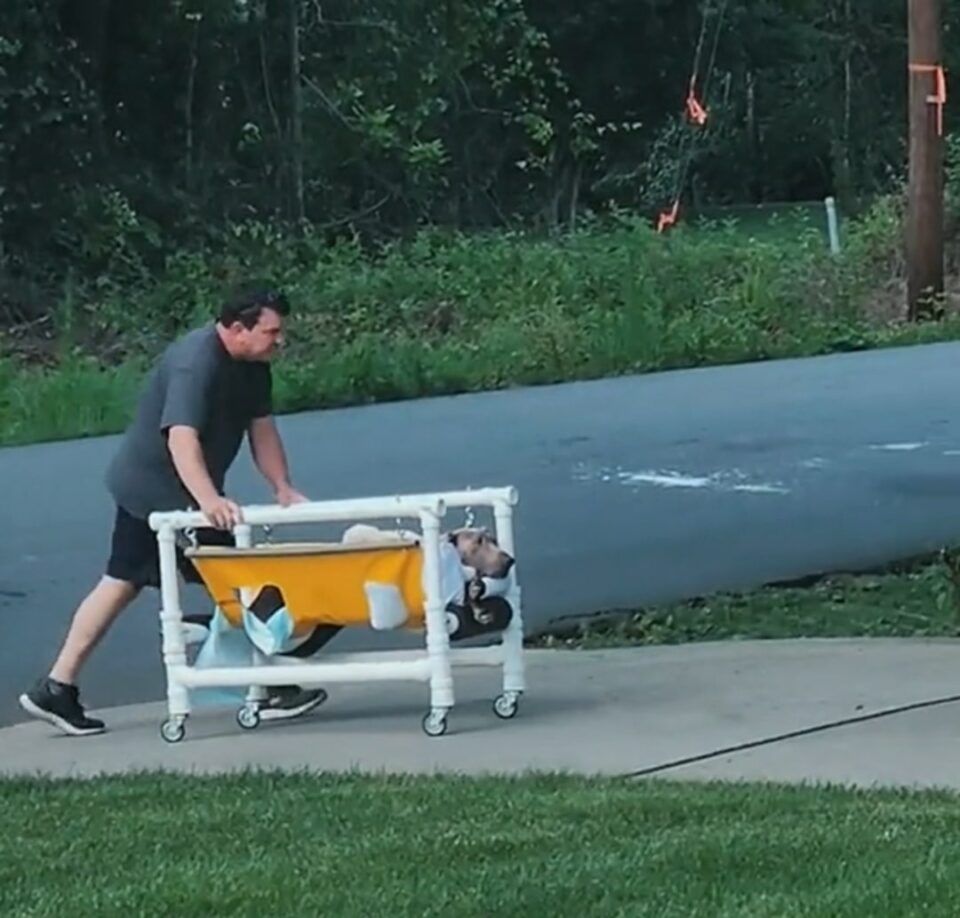No dog owner wants to see their beloved companion suffering. Yet, as they age, we’re faced with the inevitable and it is only a matter of time before our dearest furry friends start experiencing discomfort, or some health issues.
For the North Carolina couple, Christiana Lovelace and her husband, Monte, that moment came a couple of years ago.
At the age of nine, their Silver Labrador, Bo, faced paralysis after being diagnosed with intervertebral disc disease. The family did everything in their power to ease Bo’s pain and be there for him, but their hope completely faded away… until, one day, a miracle happened!
The Moment Of Pure Happiness

Bo’s been suffering from this degenerative condition that often ranges from discomfort in the back area to paralysis. Sadly, as a result, this Lab wasn’t able to move at all.
In the fall of 2022, he ruptured a disc in his back. Then, again, two in his neck, which made him completely paralyzed.
After researching many options, among which, they tried rehabilitation and acupuncture, the family “stumbled upon” the perfect medicine! Thanks to steroid treatment, Bo started to feel a lot better until, eventually, he managed to make his first steps (again)!
For the North Carolina family, seeing Bo move again was the moment of pure happiness.
“I can’t believe we finally made it this far…after three ruptured discs, 2 surgeries and I honestly thought we nightfall said goodbye to him by now – but he’s still trucking,” Christina wrote in a TikTok post.
After all those sleepless nights and days, they just couldn’t believe that this nine-year-old boi would ever walk again. Yet, it happened – and both Bo and his owners couldn’t be happier!
Sometimes, He Forgets That He Can Do It

After only a few weeks in treatment, Bo was able to walk without any help. He’d usually spend his days lying in his bed, with his mom and dad’s cuddles being the high point of his day. And, now, he’s finally able to stand up on his paws – and initiate cuddles himself!
As a result of his years-long paralysis, Bo sometimes forgets that he can actually walk.
He falls asleep on his bed, and when he wakes up – he refuses to move until his pawrents encourage him to do so.
But, even then, Monte and Christiana have the perfect solution!

His dad built a customized cart for Bo where he can sit, relax, and do his rehabilitation. And, when he doesn’t feel like walking at all – Monte makes sure to give his dog a nice ride in his cart, which Bo just loves so much!
Christiana’s been posting updates on Bo’s journey on her official TikTok account. Throughout his recovery, thousands of people have been rooting for this adorable Lab, and now he has a whole community supporting him.
Despite having officially entered his golden years, I’m positive that Bo has many good days ahead of him — and many adventures to embark upon!
If you’ve ever found yourself wondering why your furry friend has a habit of nibbling on you, you’re not alone. Dogs have their unique ways of communicating, and those nibbles might just be their way of showing affection or seeking attention. As a seasoned dog trainer, I’ve seen this behavior time and time again, and there’s more to it than meets the eye.
When your dog gently nibbles on you, it could be their way of bonding with you or even a sign of playfulness. Understanding the reasons behind this behavior can strengthen the bond between you and your canine companion. So, next time you feel those tiny nips, remember, there’s a whole world of canine communication behind them.
Understanding Dog Behavior: The Basics of Nibbling
The Difference Between Nibbling and Biting
When your dog nibbles you, it’s essential to distinguish between nibbling and biting. Nibbling is typically gentle and involves soft, playful bites without breaking the skin. It’s a form of communication for dogs, often used to show affection or seek attention. On the other hand, biting is more forceful and can cause harm. Understanding this difference is crucial in interpreting your dog’s intentions accurately.
Common Reasons for Nibbling in Dogs
Several reasons may explain why your dog nibbles on you. One common reason is that nibbling is a way for your furry friend to show affection. Dogs use their mouths to explore the world, and gentle nibbles could be their way of bonding with you. Additionally, dogs may nibble when they are seeking attention from their owners. It’s their way of communicating their needs and desires. Another common reason for nibbling is playfulness; dogs often engage in playful nibbling during interactions with their favorite humans. Understanding these common reasons for nibbling can help strengthen the bond between you and your canine companion.
The Affectionate Nibble: Signs of Love and Attention
How Nibbling Can Strengthen Your Bond
When your dog nibbles you gently, it’s often a sign of their affection towards you. This behavior can actually strengthen the bond between you and your furry friend. By reciprocating with gentle petting or praise when your dog nibbles, you’re reinforcing positive behavior and creating a deeper connection with them.
Recognizing Affectionate Nibbles Versus Aggressive Behavior
Distinguishing between affectionate nibbles and aggressive biting is crucial. Affectionate nibbles are typically soft, gentle, and accompanied by relaxed body language from your dog. On the other hand, aggressive biting is forceful, may be accompanied by growling or snapping, and is a sign of distress or discomfort. Understanding these differences will help you respond appropriately and nurture a loving relationship with your canine companion.
Communication Through Nibbles
What Your Dog May Be Trying to Tell You
When your dog nibbles on you, it’s their way of communicating with you. Dogs are known for using nibbling as a form of affection or seeking attention. It can be a sign that they want to play with you or engage in some interaction. By understanding this behavior, you can respond appropriately and strengthen your bond with your furry friend.
Deciphering the Nibble: From Playfulness to Anxiety
Deciphering your dog’s nibbles is essential to understanding their emotions. Playful nibbles are often light and accompanied by wagging tails, indicating a fun and playful mood. On the other hand, nibbles driven by anxiety may be more intense or persistent, showing that your dog may be feeling stressed or overwhelmed. By observing the context and intensity of the nibbles, you can better grasp your dog’s emotional state and provide the necessary support and reassurance.
Managing and Redirecting Nibbling Behavior
Training Techniques to Discourage Nibbling
To deter your dog from nibbling, provide chew toys for redirection. When your dog starts nibbling on you, calmly give them a toy to chew instead. This teaches them what is acceptable to nibble on. Consistency is key in training your dog; reinforce this behavior each time they nibble.
When to Seek Professional Help
If your dog’s nibbling escalates into aggressive biting or if redirection techniques don’t work, it’s time to seek professional help. A dog behaviorist can assess the underlying reasons for the nibbling and provide tailored strategies to address the issue. Remember, professional guidance can make a difference in modifying your dog’s behavior effectively.
Nibbling and Health: When It Might Be a Concern
Dental Issues and Nibbling
If your dog suddenly starts nibbling more than usual, it could signal dental problems. Pain or discomfort in their teeth or gums might lead them to nibble as a way to alleviate the discomfort. Check for signs like bad breath, drooling, or pawing at the mouth. A visit to the vet can help identify and address any dental issues causing the extra nibbling.
Other Medical Reasons Behind Nibbling
In some cases, increased nibbling could indicate underlying medical conditions such as skin allergies, parasites, or even neurological issues. If your dog’s nibbling seems excessive or out of the ordinary, it’s crucial to consult with a veterinarian. They can perform tests to rule out any medical reasons behind the behavior and recommend appropriate treatment.
Remember, observing changes in your dog’s nibbling behavior and being proactive about addressing any health concerns can help ensure their well-being and strengthen your bond.
Conclusion
Understanding why your dog nibbles you is crucial for building a strong bond and ensuring their well-being. By recognizing the various reasons behind this behavior, such as communication, dental issues, or discomfort, you can address any underlying issues promptly. Remember to differentiate between harmless nibbling and potentially harmful biting, using training techniques and seeking professional guidance when needed. Monitoring changes in your dog’s nibbling behavior and seeking veterinary advice can help maintain their health and strengthen the connection between you and your furry friend. Stay attentive to your dog’s cues and always prioritize their happiness and health.
Frequently Asked Questions
Why do dogs nibble on their owners?
Dogs nibble on their owners as a form of communication. They use this behavior to show affection, seek attention, or play with their owners. It’s essential to differentiate between gentle nibbling, which is harmless, and aggressive biting. Training and setting boundaries can help manage nibbling behavior positively.
When should I seek professional help for my dog’s nibbling behavior?
If your dog’s nibbling escalates into harmful biting, seeking professional help from a dog trainer or behaviorist is crucial. They can provide guidance on effective training techniques and behavior modification strategies to address and correct the issue.
What could increased nibbling in dogs indicate?
Increased nibbling in dogs could indicate underlying issues such as dental problems, pain, discomfort, or medical conditions like skin allergies or parasites. Monitoring changes in nibbling behavior is essential. If you notice persistent or unusual nibbling patterns, it’s advisable to consult a veterinarian to rule out any potential health concerns and ensure your dog’s well-being.
[no_toc]

Hey there, I’m Janet Brooks, a dog-loving student from California. I’m all about helping pups in need, especially those without homes. Me and my awesome friends work together to give shelter and love to stray dogs. Oh, and I also write blogs about dogs to share helpful info.